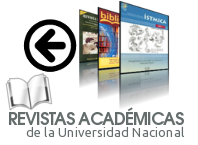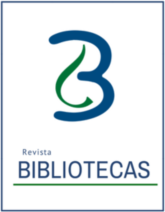A organização temática dos recursos de informação nas bibliotecas: uma breve análise diacrónica desde a antiguidade até aos dias de hoje
DOI:
https://doi.org/10.15359/rb.39-1.3Resumo
A organização temática dos recursos de informação nas bibliotecas tem sido uma actividade substancial que tem prevalecido desde as civilizações antigas até aos dias de hoje. O objectivo deste documento é traçar uma revisão diacrónica da actividade, considerando os recursos, o processo, as pessoas que a desenvolvem e as linguagens auxiliares de indexação. A metodologia utilizada consistiu na análise de um conjunto de fontes de informação académica sobre o assunto. Verificou-se que a organização temática dos recursos de informação passou por várias fases, englobadas em quatro períodos: (1) antes do estabelecimento da biblioteconomia como disciplina, (2) a normalização bibliotecária dos séculos XIX e XX, (3) os tempos da segunda metade do século XX e (4) o alvorecer do século XXI. Conclui-se que a disposição temática dos recursos de informação é uma actividade em constante evolução, com base nos recursos de informação, nas tecnologias para a sua disposição e nas necessidades da população de utilizadores.
Referências
ALA. (2020). American Library Associatión (ALA). Recuperado de http://www.ala.org/
Arnau, P. (1995). Trascendencia de la vida y obra de Paul Otlet. Revista General de Información y Documentación, 5(2), 153-162.
Barité, M. (2015) Diccionario de organización del conocimiento: Clasificación, indización, terminología. Montevideo: Universidad de la República de Uruguay.
Bates, M. y Maack, M.N. (ed). (2010) Encyclopedia of library and information sciences. 3ª ed. Boca Ratón, Florida: CRC.
Borcoman, M. (2017). Niniveh and Alexandria: the two vanished libraries of antiquity. Romanian Journal of Library and Information Science. 13, 109-112.
Chan, L.M. (2020). Still robust at 100. A century of LC subject headings. Recuperado de https://www.loc.gov/loc/lcib/9808/lcsh-100.html.
Chowdhury, G. y Chowdhury, S. (2007). Organizing information: from the shelf to the web. Londres: Facet Publishing.
Chu, H. (2010) Information representation and retrieval in the digital age. Medford, New Jersey: Information Today.
Cleveland, D. y Cleveland, A. (2013). Introduction to indexing and abstracting. Santa Barbara, California: Libraries Unlimited.
Cutter, Ch. (1891). Rules for a dictionary catalogue. Washington: Goverment Printing Office.
Dix, T. (1994). “Public libraries” in Ancient Rome: ideology and reality. Libraries & Culture. 29(3), 282-296.
Galende Díaz, J. (1996). Las bibliotecas de los humanistas y el renacimiento. Revista general de información y documentación, 6 (2), 91-123.
Gil-Leiva, I. (2008). Manual de indización: teoría y Práctica. Gijón: TREA.
Gil-Leiva, I. y Rodríguez-Muñoz, J. (1997). De la indización humana a la indización automática. En García Marco, F. J. Organización del conocimiento en sistemas de información y documentación: actas del II Encuentro de ISKO-España (201-215). Zaragoza, España: Universidad de Zaragoza.
Haikal. F. (2008). Private collections and temple libraries in ancient Egypt. En El-Abbadi, M., ¿ed. What happened to the ancient library of Alexandria? (39-54). Leiden: Brill.
Hider, P y Harvey, R. (2008). Organizing knowledge in a global society: principles and practices in libraries and information centres. Australia: Centre for Information Studies.
Hjørland, B. (1997). Information seeking and subject representation: an activity-theoretical approach to information science. Westport, Connecticut: Greenwood.
Hodge, G. (2000). Systems of knowledge for digital libraries: beyond traditional authority files. Washington: Council on Library and Information Resources.
IFLA. (2010). Functional Requirements for Subject Authority Data (FRSAD). Recuperado de https://www.ifla.org/files/assets/classification-and-indexing/functional-requirements-for-subject-authority-data/frsad-final-report.pdf.
Keyser, P. (2012). Indexing: from thesauri to the semantic web. Oxford, Reino Unido: Chandos Publishing.
Lor, P. (2019). What were librarians doing while Otlet was inventing documentation? the modernization and professionalization of librarianship during the Belle Époque. Italian Journal library. Archives and Information Sciencie. 10(3), 18-33.
Mahapatra, P. y Bhubaneswar, Ch. (1999). Organizing information in libraries. Nueva Delhi: Ess Ess.
Martínez, F. (2012). Retos de la catalogación y los catálogos. Investigación Bibliotecológica, 26(58), 7-12.
O’Brien, J. (2016). Epilogue: medieval libraries in the sixteenth century: a dream of order and knowledge. French Studies: A Quarterly Review, 70(2), 228-238.
Oldfather, W.A. (1938). The maintenance of ancient Greek public libraries. The Library Quarterly: Information, Community, Policy, 8(2), 287-288.
Olesen Bagneux, O. (2014). The memory library: how the library in hellenistic Alexandria worked. Knowledge Organization, 41(1), 3-13.
Olof, P. (1998). Archives and libraries in the ancient near east 1500-300 B. C. Bethesa, Maryland: CDL Press.
Peña Vera, T. (2011). Organización y representación del conocimiento: incidencias de la tecnología de información y comunicación. Buenos Aires: Alfagrama.
Polastron, L. (2007). Libros en llamas. Historia de la interminable destrucción de bibliotecas. México: Fondo de Cultura Económica.
Rubin, R. (2010). Foundations of library and information science. New York: Neal-Schuman.
Stockwell, F. (2001). History of information storage and retrieval. Jefferson, California del Norte: McFarland & Company.
Suárez Sánchez, A. (2017). Sistemas para la organización del conocimiento: definición y evolución histórica. E-Ciencias de la Información, 7(2), 1-19.
Tucci, P. (2013). Galen and the library at antium: the state of the question. Classical Philology, 108(3), 240-251.
Webb, K. (2013). The house of books: libraries and archives in Ancient Egypt. Libri, 63(1), 21-32.
Witty, F. (1973). The beginnings of indexing and abstracting: some notes towards a history of indexing and abstracting in antiquity and the middle ages. The indexer, 8(1), 193-198.
Witty, F. (1958). The Pínakes of Callimachus. Library Quarterly, 28(2), 132-136.
Zinn, K. (2007). Libraries and archives: the organization of collective wisdom in ancient Egypt. En Cannata, M, ed. Current research in egyptology 2006: proceedings of the 7th annual symposium. Oxford: University of Oxford.
Downloads
Publicado
Como Citar
Edição
Seção
Licença
Bibliotecas proporciona acceso abierto inmediato a sus contenidos, basándose en el principio de facilitar la investigación al público de manera gratuita y libre para favorecer el intercambio global del conocimiento.
La revista Bibliotecas es una publicación acogida por una institución de educación superior pública, la cual, es sustentada por recursos públicos. Desde sus inicios, la revista ha ofrecido todos sus contenidos de forma gratuita sin ninguna restricción a los derechos de: lectura, descarga e impresión a texto completo. Los trabajos publicados en Bibliotecas pueden ser analizados, citados y reproducidos total o parcialmente, mencionando la fuente original.
La revista Bibliotecas está bajo la licencia de Creative Commons Reconocimiento – No Comercial – Compartir Igual, 4.0 Internacional; por lo que se permite: compartir, copiar y redistribuir el material en cualquier medio o formato.

Este obra está bajo una licencia Creative Commons Atribución-NoComercial-CompartirIgual 4.0 Internacional.






